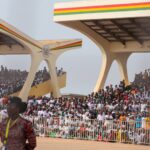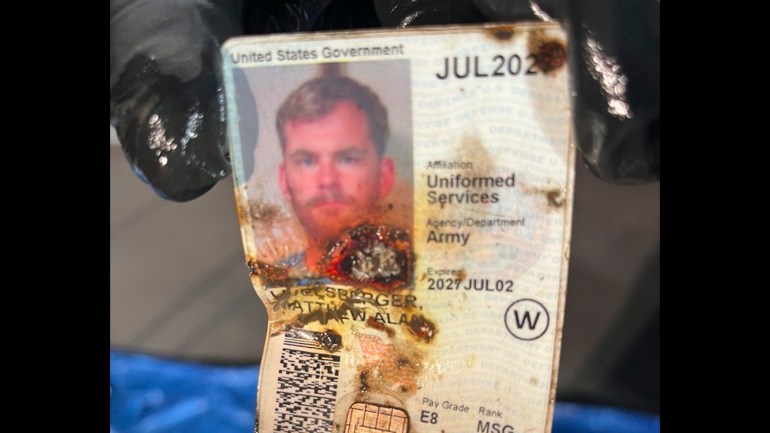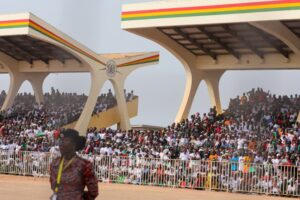The soldier, Matthew Livelsberger, was found dead in the wreckage of the New Year’s Day explosion outside a Trump hotel.
Authorities in the United States investigating the explosion of a Cybertruck in front of a Trump-brand hotel in Las Vegas have released new details about the motivation behind the blast.
On Friday, investigators with the Federal Bureau of Investigation (FBI) indicated that the soldier behind the explosion appeared to be suffering from post-traumatic stress disorder, or PTSD.
“Although this incident is more public and more sensational than usual, it ultimately appears to be a tragic case of suicide involving a heavily decorated combat veteran who was struggling with PTSD and other issues,” Spencer Evans, the FBI special agent in charge, explained at a news conference.
The FBI added there was no evidence the soldier, 37-year-old Matthew Livelsberger, bore animus against President-elect Donald Trump, despite the explosion’s conspicuous location and details.
Cybertrucks are manufactured by Tesla, the electric vehicle company founded by Trump supporter Elon Musk.
A coroner’s report indicates Livelsberger died of suicide shortly before the explosion. His body was found in the charred remains of the Cybertruck, and a handgun was discovered by his feet.

The explosion spurred widespread speculation on New Year’s Day, as the US grappled with a suspected “terrorism attack” in the city of New Orleans that killed 14 victims.
Advertisement
Seven people received minor injuries when the rented Cybertruck blew up in the valet circle just outside the glass doors of the Trump International Hotel in Las Vegas on the same day.
One person, later identified as Livelsberger, was also found dead at the scene. The car had been packed with fireworks and fuel canisters.
Friday’s news conference coincided with the release of excerpts of a note Livelsberger left behind, explaining his motivation for the blast.
In the note, Livelsperger – a Green Beret in the army who served in Afghanistan and other locations – described feeling the need to “cleanse my mind” of the “burden of the lives I took”.
“This was not a terrorist attack, it was a wakeup call,” Livelsperger wrote. “Americans only pay attention to spectacles and violence. What better way to get my point across than a stunt with fireworks and explosives.”
Originally from Colorado Springs, Colorado, Livelsperger had served in the military in various roles since 2006, and he had received five Bronze Stars for his achievements.
He was on an approved leave of duty when he took his life.

The suspect in the New Orleans attack, Shamsud-Din Jabbar, was likewise a military veteran. He intentionally rammed a rented Ford pick-up truck into a New Year’s holiday crowd on Bourbon Street, before dying in a shootout with police.
No connection has been found between the two incidents, though investigators have said they are exploring every possible lead.
Advertisement
On Friday, a former girlfriend of Livelsperger, nurse Alicia Arritt, told The Washington Post that the Green Beret suffered from deep guilt over his experiences in combat.
She suspects his symptoms, which included a foggy memory, could have resulted from a head injury or bodily trauma.
“He wanted to get more help,” Arritt told the Post in her interview. “I think it was even harder for him, being on active duty – the shame and the stigma.”
A neighbour, Cindy Helwig, told The Associated Press she remembered Livelsperger had recently come to her for a tool to fix his SUV.
“He was a normal guy,” she said.











More Stories
Danish PM says Greenland ‘not for sale’ as Donald Trump Jr visits island
John Mahama sworn in as Ghana’s president, promises to ‘reset’ the country
Who will replace Trudeau as Canada’s Liberal party leader?